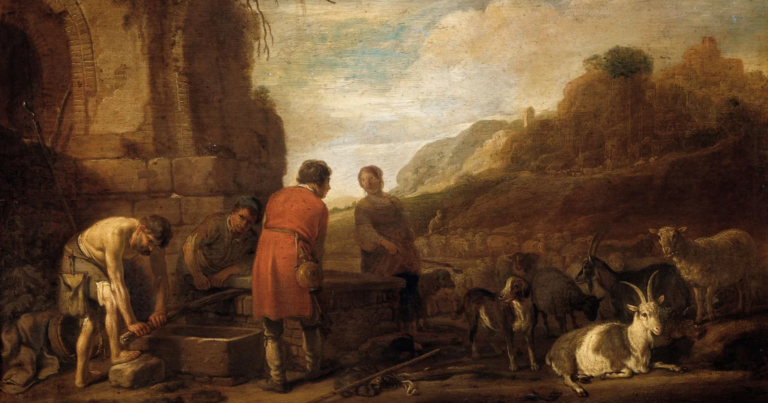“And I will give you a new heart, and a new spirit I will put within you. And I will remove the heart of stone from your flesh and give you a heart of flesh.”
Ezekiel 36:26
The Book of Prophet Ezekiel, a vital part of biblical literature, often seems complex and challenging to modern readers.
Yet, beneath its intricate visions and profound prophecies lie messages that resonate deeply with today’s believers.
Ezekiel called to prophesy during Israel’s darkest hours, brings a message of divine judgment intertwined with unyielding hope.
His experiences provide a powerful reflection on the consequences of straying from faith and the enduring mercy of God.
This article aims to demystify its teachings, providing a simplified guide for current believers.
We will delve into Ezekiel’s profound messages, navigating the prophetic visions and parables to extract valuable lessons applicable to our daily lives.
Who is Ezekiel?
Ezekiel is one of the four Major Prophets in the Bible, along with Isaiah, Jeremiah, and Daniel.
These prophets are known for their long messages and deep teachings.
Ezekiel was a priest who became a prophet during a tough time for Israel, when many people, including him, were taken away to Babylon.
Being far from home, Ezekiel was the first prophet to get his call from God while outside of Israel. But guess what?
This didn’t stop him from sharing God’s messages.
He talked a lot about how people were not following God and the consequences of that. But he also gave them hope, saying that one day things would get better.
Therefore, Ezekiel’s job was to be a messenger from God. He worked hard to explain God’s rules and how people could come back to God.
Even though his messages were sometimes hard to hear, they were about God’s love and how He wanted to fix things. Ezekiel’s stories help us understand how important it is to listen to God and live the right way.
What is Ezekiel’s prophecy?
Ezekiel’s prophecy is a rich and complex part of the Bible that offers insights into both the consequences of Israel’s disobedience and the hope for its future restoration.
Ezekiel, living in exile, receives visions from God that he shares with the people. His prophecies range from warnings of impending doom to promises of renewal and redemption.
Here’s an overview of some key prophecies Ezekiel shares:
- The vision of the four living creatures: Ezekiel describes a heavenly chariot with four living creatures, each having four faces and wheels within wheels with eyes all around. This vision symbolizes God’s glory and omnipresence.
- The fall of Jerusalem: He predicts the siege and fall of Jerusalem as a consequence of the people’s sins, particularly idolatry and turning away from God.
- The Valley of dry bones: Perhaps one of his most famous visions, where dry bones come to life, symbolizing the restoration of Israel and the resurrection of the people’s spirit.
- The restoration of the temple: Ezekiel provides detailed plans for a new, glorified Temple, signifying the renewal of the covenant between God and His people.
- Gog and Magog: He prophesies a future battle involving Gog of Magog. It represents a coalition against Israel, which ends with God’s intervention and victory.
5 central themes of Ezekiel
1) God’s sovereignty
One big idea in Ezekiel is that God is in charge, no matter what.
The theme of God’s sovereignty prevails throughout the Book of Ezekiel and portrays God as the ultimate authority, controlling every event and determining every outcome.
Ezekiel shows us that God knows what’s happening and has a plan for everything.
Whether it’s guiding a whole nation or looking after one person, God is calling the shots.
This theme is a reminder for us today. When life gets confusing or tough, remember, God is still in control, offering a sense of comfort and security to modern believers.
2) Divine judgment and human responsibility
“I will make a covenant of peace with them; it will be an everlasting covenant. I will establish them and multiply them, and I will set my sanctuary in their midst forevermore.”
Ezekiel 37:26
Ezekiel doesn’t shy away from a tough truth: our actions have consequences.
He talks a lot about how people were not living the way God wanted, and because of that, tough times were coming.
But here’s the interesting part: Ezekiel also says we’re not just puppets.
We have a choice.
We can decide to follow God’s ways or go our own way.
That’s why I believe this message makes us stop and think, doesn’t it? How do our choices line up with what God wants?
Consider it a nudge to reflect on our own lives and see where we might need to make some changes.
3) Angels as messengers
In Ezekiel’s visions, angels, particularly cherubim, play a pivotal role as divine messengers and protectors.
Drawing on the rich tradition of angelology, Thomas Aquinas, a medieval scholar, delved into the hierarchy of these celestial beings.
He categorized them into nine orders within three groups, with Cherubim standing close to God alongside Seraphim and Thrones.
Cherubim, as depicted in Ezekiel 10:1-22, are not just winged creatures. They symbolize God’s omnipotence and presence.
Ezekiel’s cherubim, with their multiple faces and wings, embody the multifaceted nature of God’s wisdom and sovereignty. They serve as a reminder of the divine order and the complexity of God’s creation.
Aquinas believed that angels influence humanity by enlightening our minds with ideas, suggesting that the cherubim’s presence in Ezekiel might also symbolize the transmission of divine knowledge and understanding to humans.
Reflecting on the cherubim prompts us to consider how divine messages and guidance manifest in our own lives.
4) Consequences of disobedience
Disobedience comes with a price.
Ezekiel doesn’t sugarcoat the reality that turning away from God leads to serious fallout.
Through vivid imagery and stark warnings, he lays out the direct link between Israel’s idolatry, moral decay, and the inevitable suffering that follows.
It’s a raw and honest look at how ignoring God’s commands can unravel the fabric of a community and individual lives.
For example, the siege of Jerusalem isn’t just a historical event; it’s a tangible consequence of collective disobedience.
This theme serves as a sobering reminder that our choices have weight and impact, urging us to consider the path we’re on.
4) The power of repentance
Now, here’s something that might seem counter-intuitive: even in the depths of our failure, there’s hope.
“I take no pleasure in the death of the wicked, but rather that they turn from their ways and live” (Ezekiel 33:11).
This quote from Ezekiel highlights a surprising truth—God is rooting for our return, not our ruin.
Repentance is powerful, not because it erases the past, but because it opens the door to a renewed relationship with God. It’s about making a U-turn, recognizing where we’ve gone wrong, and taking steps to correct our course.
But the question is, how often do we sincerely repent for our wrongdoings?
Modern believers are called to reflect on this theme, acknowledging our missteps and turning back to God with a contrite heart.
This isn’t just about saying sorry — it’s a transformative process that can change the direction of our lives.
5) Promise of restoration
Despite the harsh warnings, Ezekiel’s book ultimately carries a message of hope.
Amid the warnings, there’s a bright light of hope—the promise of restoration. The vision of the Dry Bones in Chapter 37 is a powerful picture of this hope.
Imagine a valley filled with dry bones suddenly coming to life, bone connecting to bone, flesh and skin forming, and breath entering these bodies.
It’s a vivid symbol of how God can revive even the most hopeless situations. For Israel, it meant the promise of returning home from exile and having a new beginning.
Again, for modern believers, this isn’t just an ancient story — it’s a reminder that no situation is too dire for God to restore.
Whether it’s personal struggles, broken relationships, or lost faith, God’s promise of renewal is real.
Just as He breathed life into those dry bones, He can breathe new life into our circumstances, reviving and restoring us in ways we can’t imagine.
Ezekiel’s influence on the New Testament
The Book of Ezekiel casts a long shadow over the New Testament, infusing it with themes, symbols, and prophecies that resonate through its writings.
Ezekiel’s visions and messages, deeply rooted in the idea of a covenant relationship between God and His people, prefigure many of the concepts that would later be fully revealed in the teachings of Jesus and the apostolic writings.
Here’s how Ezekiel’s influence permeates the New Testament:
- Salvation by grace: Ezekiel’s prophecy that God will give His people a new heart and a new spirit (Ezekiel 36:26) lays the groundwork for the New Testament’s emphasis on salvation by grace.
- Baptism: The promise of cleansing and renewal found in Ezekiel 36:24-28, where God declares He will sprinkle clean water on His people, can be seen as an anticipation of baptism.
- The Holy Spirit: Ezekiel’s promise of God pouring out His Spirit on His people (Ezekiel 36:26, 39:29) is fulfilled in the New Testament, most notably at Pentecost.
- Apocalyptic Imagery: The Book of Revelation draws heavily on Ezekiel’s imagery. The eating of the scroll by Ezekiel (Ezekiel 2:1-10) parallels John’s similar experience in Revelation 10:1-10. Ezekiel’s description of cosmic disturbances (Ezekiel 32:7) prefigures the apocalyptic events in Revelation 6:12.
Ezekiel’s influence on the New Testament is profound, providing a theological and literary bridge that connects Old Testament promises with their New Testament fulfillment.
Final thoughts: Embracing Ezekiel’s timeless wisdom
Diving into the Book of Ezekiel offers a rich journey through visions of hope, calls for repentance, and promises of restoration.
For those looking to deepen their understanding, consider studying Ezekiel alongside New Testament texts to see the profound connections.
Engage with commentaries to explore the historical and cultural context of his prophecies.
Most importantly, let Ezekiel inspire you to reflect on your own relationship with God, recognizing His sovereignty, embracing His call to repentance, and holding onto the promise of restoration.
After all, Ezekiel’s ancient words still speak powerfully today, inviting us to live in the light of God’s enduring truth and grace.













